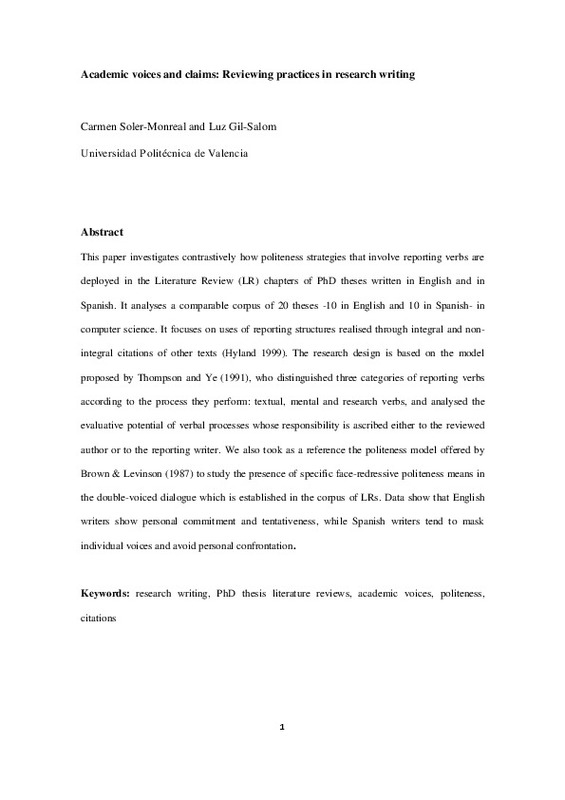BIBER, D., & FINEGAN, E. (1989). Styles of stance in English: Lexical and grammatical marking of evidentiality and affect. Text - Interdisciplinary Journal for the Study of Discourse, 9(1). doi:10.1515/text.1.1989.9.1.93
Brown, P., Levinson, S. C., & Gumperz, J. J. (1987). Politeness. doi:10.1017/cbo9780511813085
Charles, M. (2006). Phraseological patterns in reporting clauses used in citation: A corpus-based study of theses in two disciplines. English for Specific Purposes, 25(3), 310-331. doi:10.1016/j.esp.2005.05.003
[+]
BIBER, D., & FINEGAN, E. (1989). Styles of stance in English: Lexical and grammatical marking of evidentiality and affect. Text - Interdisciplinary Journal for the Study of Discourse, 9(1). doi:10.1515/text.1.1989.9.1.93
Brown, P., Levinson, S. C., & Gumperz, J. J. (1987). Politeness. doi:10.1017/cbo9780511813085
Charles, M. (2006). Phraseological patterns in reporting clauses used in citation: A corpus-based study of theses in two disciplines. English for Specific Purposes, 25(3), 310-331. doi:10.1016/j.esp.2005.05.003
Charles, M. (2006). The Construction of Stance in Reporting Clauses: A Cross-disciplinary Study of Theses. Applied Linguistics, 27(3), 492-518. doi:10.1093/applin/aml021
Cooley, L., & Lewkowicz, J. (s. f.). Developing awareness of the rhetorical and linguistic conventions of writing a thesis in English: addressing the needs of EFL/ESL postgraduate students. Culture and Styles of Academic Discourse. doi:10.1515/9783110821048.113
Garcés-Conejos, P., & Sánchez-Macarro, A. (1998). Scientific discourse as interaction. Current Issues in Linguistic Theory, 173. doi:10.1075/cilt.158.13gar
Hunston, S. (1993). Professional Conflict — Disagreement in Academic Discourse. Text and Technology, 115. doi:10.1075/z.64.08hun
HYLAND, K. (1996). Writing Without Conviction? Hedging in Science Research Articles. Applied Linguistics, 17(4), 433-454. doi:10.1093/applin/17.4.433
Hyland, K. (1998). Persuasion and context: The pragmatics of academic metadiscourse. Journal of Pragmatics, 30(4), 437-455. doi:10.1016/s0378-2166(98)00009-5
Hyland, K. (1998). Hedging in Scientific Research Articles. Pragmatics & Beyond New Series. doi:10.1075/pbns.54
Hyland, K. (1999). Academic attribution: citation and the construction of disciplinary knowledge. Applied Linguistics, 20(3), 341-367. doi:10.1093/applin/20.3.341
Hyland, K. (2008). Disciplinary voices: Interactions in research writing. English Text Construction, 1(1), 5-22. doi:10.1075/etc.1.1.03hyl
Hyland, K., & Diani, G. (Eds.). (2009). Academic Evaluation. doi:10.1057/9780230244290
Koutsantoni, D. (2006). Rhetorical strategies in engineering research articles and research theses: Advanced academic literacy and relations of power. Journal of English for Academic Purposes, 5(1), 19-36. doi:10.1016/j.jeap.2005.11.002
Koutsantoni, D. (2004). Attitude, certainty and allusions to common knowledge in scientific research articles. Journal of English for Academic Purposes, 3(2), 163-182. doi:10.1016/j.jeap.2003.08.001
Kuo, C.-H. (1999). The Use of Personal Pronouns: Role Relationships in Scientific Journal Articles. English for Specific Purposes, 18(2), 121-138. doi:10.1016/s0889-4906(97)00058-6
Kwan, B. S. C. (2006). The schematic structure of literature reviews in doctoral theses of applied linguistics. English for Specific Purposes, 25(1), 30-55. doi:10.1016/j.esp.2005.06.001
Lave, J., & Wenger, E. (1991). Situated Learning. doi:10.1017/cbo9780511815355
LoCastro, V. (2008). «Long sentences and floating commas»: Mexican students’ rhetorical practices and the sociocultural context. Contrastive Rhetoric, 195-217. doi:10.1075/pbns.169.13loc
Miller, C. R. (1984). Genre as social action. Quarterly Journal of Speech, 70(2), 151-167. doi:10.1080/00335638409383686
MYERS, G. (1989). The pragmatics of politeness in scientific articles. Applied Linguistics, 10(1), 1-35. doi:10.1093/applin/10.1.1
Myers, G. (1992). ‘In this paper we report …’’: Speech acts and scientific facts. Journal of Pragmatics, 17(4), 295-313. doi:10.1016/0378-2166(92)90013-2
O’Driscoll, J. (1996). About face: A defence and elaboration of universal dualism. Journal of Pragmatics, 25(1), 1-32. doi:10.1016/0378-2166(94)00069-x
Paltridge, B. (2002). Thesis and dissertation writing: an examination of published advice and actual practice. English for Specific Purposes, 21(2), 125-143. doi:10.1016/s0889-4906(00)00025-9
SHAW, P. (1992). Reasons for the Correlation of Voice, Tense, and Sentence Function in Reporting Verbs. Applied Linguistics, 13(3), 302-319. doi:10.1093/applin/13.3.302
Soler Monreal, C., & Gil Salom, L. (2011). A cross-language study on citation practice in PhD theses. International Journal of English Studies, 11(2), 53. doi:10.6018/ijes/2011/2/149641
Stotesbury, H. (2003). Evaluation in research article abstracts in the narrative and hard sciences. Journal of English for Academic Purposes, 2(4), 327-341. doi:10.1016/s1475-1585(03)00049-3
Thomas, S., & Hawes, T. P. (1994). Reporting verbs in medical journal articles. English for Specific Purposes, 13(2), 129-148. doi:10.1016/0889-4906(94)90012-4
Thompson, P. (2005). Aspects of identification and position in intertextual reference in PhD theses. Strategies in Academic Discourse, 31-50. doi:10.1075/scl.19.04tho
Thompson, P. (2005). Points of focus and position: Intertextual reference in PhD theses. Journal of English for Academic Purposes, 4(4), 307-323. doi:10.1016/j.jeap.2005.07.006
THOMPSON, G., & YIYUN, Y. (1991). Evaluation in the Reporting Verbs Used in Academic Papers. Applied Linguistics, 12(4), 365-382. doi:10.1093/applin/12.4.365
Weigand, E. (2009). Language as Dialogue. Dialogue Studies. doi:10.1075/ds.5
Weigand, E. (2010). Dialogue – The Mixed Game. Dialogue Studies. doi:10.1075/ds.10
Wenger, E. (1998). Communities of Practice. doi:10.1017/cbo9780511803932
[-]









